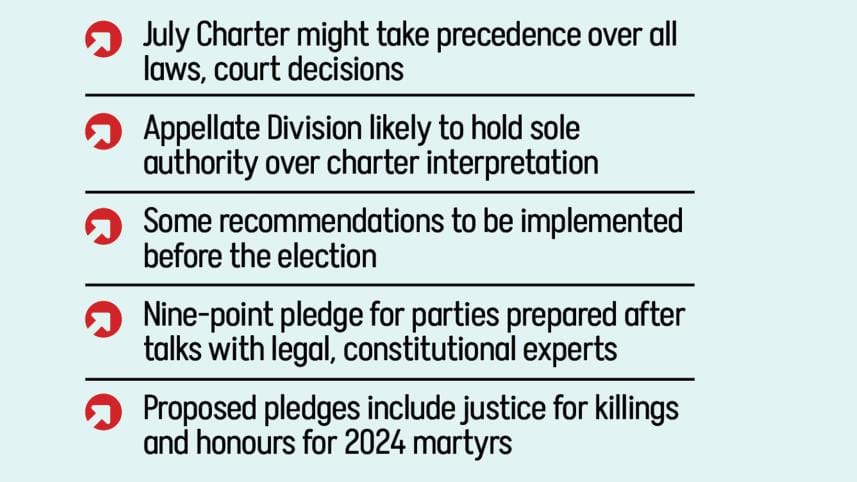July charter: Commission likely to push parties for legally binding deal

Following demands from several parties, including Jamaat-e-Islami, National Citizen Party, and Islami Andolan Bangladesh, the National Consensus Commission is considering a proposal to make the July National Charter a legally binding document.
The commission is likely to urge political parties to pledge to enact an ordinance with special constitutional provisions, giving the charter the highest legal authority with precedence over all other laws and court rulings.
According to pledges for the parties in the latest draft of the July National Charter 2025, parties are likely to be asked to commit to ensuring full legal and constitutional protection at every stage of implementing it. If any word, sentence, or policy of the charter conflicts with the constitution or other laws, the charter would prevail.
The commission will also seek a pledge from the parties to give constitutional and state recognition to the uninterrupted struggle for democracy, human rights, and justice, and to the historical significance of the 2024 anti-discrimination democratic movement and mass uprising.
Prof Ali Riaz, vice-president of the commission, told The Daily Star yesterday that they hope to send the draft to the political parties today or tomorrow. "Our work on the draft is at the final stage," he said.
Asked whether the document will be legally binding, he said the commission was holding discussions with legal experts on the matter.
Prof Riaz yesterday briefed Chief Adviser Prof Muhammad Yunus on the overall progress of the July Charter. Asked when the commission would hold its third-phase meetings with political parties on the implementation and legal basis of the charter, he said no decision has yet been made.
The pledges to be sought from the parties also include ensuring constitutional recognition of the July uprising, justice for those killed during the uprising, granting state honours to the martyrs, and arranging treatment and rehabilitation for the injured.
"Any recommendations in this charter deemed immediately implementable will be carried out by the government and relevant authorities without delay and with effective measures before the next national parliamentary election," one of the pledges in the draft states.
On Sunday and Tuesday, the commission held talks with constitutional and legal experts and, according to sources, prepared a nine-point pledge for implementing the charter.
Prof Riaz told The Daily Star that discussions were held on how to implement the July Charter and give it legal backing, and that various proposals were presented.
However, he added that the pledges for the charter's implementation and legal basis have not yet been finalised, and the discussion is ongoing.
The July 2024 mass uprising, led by students and the public, toppled the Awami League government. On August 8, an interim government headed by Nobel laureate Prof Muhammad Yunus took office.
After the Prof Muhammad Yunus-led interim government took charge following the fall of the Awami League regime in August last year, six commissions were initially formed to recommend basic reforms. Later, Prof Yunus formed the consensus commission with heads of the reform commissions. Under Prof Yunus, the consensus commission is tasked with preparing the July Charter through dialogues with and consensus among political parties, to serve as a blueprint for future governance.
In March, the commission held its first round of talks with 32 political parties and alliances on 166 proposals, reaching consensus on 62. In the second round, agreement was reached on 20 issues, while BNP, Jamaat, NCP and others placed notes of dissent on nine.
The preliminary draft of the charter, based on the 82 agreed proposals, was sent to the parties on July 28. In that draft, the commission asked parties to pledge to recognise and "enshrine the historical importance of the 2024 anti-discrimination democratic movement and popular uprising in the constitution with due prominence".
That version, however, made no mention of constitutional and state recognition for the broader democratic struggle or of ensuring justice for the killings.
Clause 3 of that draft proposed implementing the recommendations within two years after the next general election, which is now slated for February 2026. BNP and like-minded parties supported this, but Jamaat, NCP, Islami Andolan, and others demanded full implementation and legal backing within the tenure of the current government, threatening to withhold their signatures otherwise.
In response, the commission began preparing an outline for swift implementation. The integrated draft now being developed will include the background of the uprising, the formation of reform commissions, the 82 agreed proposals, and the nine-point pledge for implementation, according to commission sources.
The pledges state that jurisdiction over the charter's interpretation and legality will rest solely with the Appellate Division. They also state that the charter will be fully legally effective, and that no court may question its legality, necessity, or authority.
They also stipulate that necessary ordinances will be issued to ensure its provisions prevail over article 93(2) of the constitution or any other law or judgment.
One of the pledges, if approved by the parties, will allow amendments to the constitution, judiciary, electoral system, public administration, policing, and anti-corruption measures, as well as the enactment or revision of laws, rules, and regulations, to implement the charter's recommendations.




 For all latest news, follow The Daily Star's Google News channel.
For all latest news, follow The Daily Star's Google News channel. 

Comments